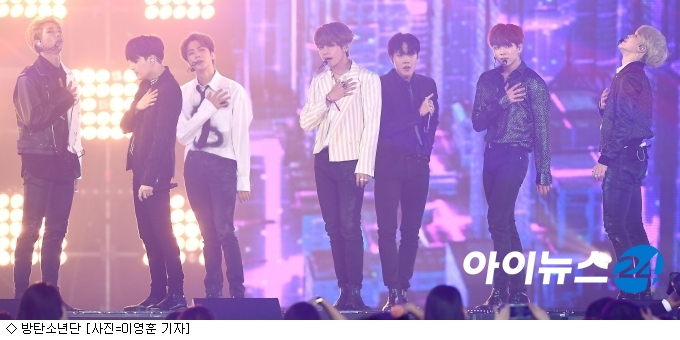
"It's more than a T-shirt issue, this is due to tensions between the two countries that have been heightened by the reparation ruling." (Billboard, a U.S. pop culture magazine)
"History tensions between the two countries peaked last month when the forced labor ruling was held; now Korea and Japan are like political minefields." (New York Times)
It is a response from foreign media after it was announced that all of the schedules for the appearance of Japan broadcasts of BTS (BTS), which is making a sensation all over Korea, have been canceled. On the 30th of last month, the Supreme Court confirmed the original ruling that "reward 100 million won to each of the Victims" in the retrial of the damages claim filed by four Japanese-made labor Victims against Japan's Shinil Iron & Steel.
BTS was scheduled to appear on TV Asahi Music Station' on the 9th ahead of the Japan Dome tour starting on the 13th. However, the previous day (8th) TV Asahi side was worn by BTS member Jimin a year ago, and suddenly took issue with the T-shirt design that was not a problem at the time, and canceled the appearance of BTS. On the back of the T-shirt were a picture of the Korean people who were in liberation calling for the Korean people, a mushroom cloud-shaped picture that occurs when the Japan atomic bomb is dropped, and the words "Patriarchy (PATRIOTISM) and Our History (OUR HISTORY) and Liberation (LIBERATION) and Korea (Korea)" in English.
NHK 'Hongbaek Gapjeon', Fuji TV 'FNS Song Festival' and Asahi TV Music Station Super Live', which were reviewing BTS' appearances, were also canceled.
On the 26th of last month, Japan's far-right media, Tokyo Sports, pointed out BTS member Jimin's T-shirt, saying, "BTS' anti-Japanese activities are being praised in Korea. This is a deep-rooted complex about the history of the country. "The analysis that Japan's forcible labor compensation ruling has had a decisive impact is dominant.
On the 8th of last month, it was the 20th anniversary of the Kim Dae-jung - Obuchi Joint Declaration'. On October 8, 1998, then President Kim Dae-jung and Prime Minister Obuchi Keizo Japan jointly declared the 'New Korea-Japan Partnership of the 21st Century' at the Korea-Japan Summit in Tokyo.
"We humbly accept the historical fact that colonial rule has caused great damage and suffering to the Korean people, and apologize from the bitter reflection and heart," he said. After the defeat, Japan's reflection and apology were the first to be left in the official document. President Kim responded, "It is a timely request for the two countries to overcome the unfortunate history of the past and to strive to develop a future-oriented relationship based on reconciliation and Select screen number cooperation." The Korean government opened the Japanese pop culture in accordance with this declaration, and the Korean Wave craze began to blow in Japan, which opened the horizon for exchanges between Korea and Japan.
Of course, after the declaration, sensitive historical issues such as territory, comfort women, history textbooks and visits to the Yasukuni Shrine were highlighted, and the two countries repeated cooperation and conflict. However, as the issue of past history can not be solved in a short period of time, it is a priority to lay the foundations for supporting unstable Korea-Japan relations.
In order to do so, not only the economy and security but also exchanges and cooperation in the cultural field should continue. Active cultural exchanges have the effect of reducing negative factors and enhancing intimacy with other countries. Japan's attitude, which prevented BTS broadcasts, only makes the enemy's history harder by worsening the feelings of the people of both countries and further destabilizing the relationship between the two countries. It's time for Japan to relive the spirit of Kim Dae-jung - Obuchi Joint Declaration'.
First of all, it is necessary to lay the foundations for supporting unstable Korea-Japan relations through cultural exchanges.